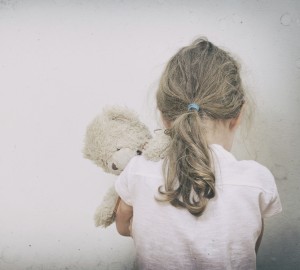 The absence of fathers in the lives of their children is not uncommon. David Blankenhorn (1995), author of Fatherless America, wrote, “The United States is becoming an increasingly fatherless society. A generation ago, an American child could reasonably expect to grow up with his father. Today, an American child can reasonably expect not to.”
The absence of fathers in the lives of their children is not uncommon. David Blankenhorn (1995), author of Fatherless America, wrote, “The United States is becoming an increasingly fatherless society. A generation ago, an American child could reasonably expect to grow up with his father. Today, an American child can reasonably expect not to.”
As this phenomenon continued to spiral, the 1990s was a time ripe for hundreds of studies of this trend, which has continued. According to a 2011 U.S. Census Bureau study, 24 million children—about one out of every three—do not live with their biological fathers.
The question as to whether absent can be equated with uninvolved has been posed repeatedly over decades by researchers such as Vicky Phares at the University of South Florida and Valarie King and Paul Amato at Pennsylvania State University. It cannot. And yet a number of studies have indicated that nonresident fathers overwhelmingly tend not to engage in frequent contact with their children.
A preponderance of studies identify at least nine factors influencing a child’s well-being when they do not live with their father—frequency of contact, age and gender of the child, the father’s economic contribution to the child’s life, the quality of the father’s relationship with the child’s mother, socioeconomic variables, education, the quality of the father’s relationship with the child, and the father’s parenting style. Five additional factors I find to be widely neglected are the presence of an alternative, or surrogate, father figure such as a stepfather, variables related to family history, length of time the father has been absent from the child’s home, and the number and presence of siblings.
Back in the ’90s, Phares found signs of increased self-worth in younger children and boys of any age when visits with fathers were frequent and regular, whereas older children and girls of any age showed signs of lower self-worth when visits were more frequent. In her studies, King (1994a) found little support for the hypothesis that father visitation in and of itself has beneficial effects for child well-being, regardless of age or gender, and expressed concern that in circumstances where there exists abuses in the father-child relationship, visitation may do more harm than good.
Rather, King (1994b) pointed to numerous studies that provided evidence that the payment of child support has beneficial effects on educational achievement as well as behavioral adjustment. Several studies have found a stronger influence from economic contributions than any other factor.
Some have studied the quality of the parental relationship in moderating child behavior. One study hypothesized that a child’s contact with his or her nonresident father would decrease the child’s behavior problems when conflict between the father and mother was low, but increase behavior problems when the interparental conflict was high. Fascinatingly, although the hypothesis was supported among boys from divorced families, no support was found among girls (Amato and Rezac, 1994).
Other studies, however, resulted in positive associations of the quality of the parental relationship and child well-being with both boys and girls. For instance, Amato and Gilbreth (1999) noted “several studies have shown that contact with nonresident fathers following divorce is associated with positive outcomes among children when parents have a cooperative relationship but is associated with negative outcomes when parents have a conflicted relationship.”
Upon examining 63 studies of nonresident fathers and their children’s well-being, Amato and Gilbreth (1999) offered this critique: “Without knowing about the behaviors that transpire between fathers and children during visits, how children feel about these visits, or the context in which these visits occur, it is difficult to make predictions about the effects of contact on specific child outcomes.”
They asserted that healthy father-child relationships enhance resilience: “When children feel loved and cared for by parents, their sense of emotional security is strengthened. Emotional security, in turn, helps children cope with stress and makes them less vulnerable to anxiety and depression.”
Many researchers hypothesized that not only the quality of the relationship but the father’s parenting style held significant influence. Amato and Gilbreth (1999) suggested, “The combination of a high level of support with a moderately high level of noncoercive control reflects authoritative parenting—the parenting style most consistently associated with children’s positive development.”
The extent to which authoritative parenting may positively influence child well-being was illustrated in a study by Young, Miller, Norton, and Hill (1995), who found that “fathers’ intrinsic support—reflected in trust, encouragement, and discussing problems—was positively correlated with children’s life satisfaction, but fathers’ extrinsic support—reflected in going out to dinner, buying things, and seeing movies together—was not related to children’s life satisfaction.”
A substantial body of empirical research has examined implications of a father’s absence on a child’s well-being, indicating evidence to support the following conclusions: (1) contact with a child does not necessarily have positive benefits; (2) economic contributions to a child have positive benefits; (3) interparental cooperation has positive benefits; (4) positive emotional involvement with a child has positive benefits; and (5) an authoritative parenting style has positive benefits.
At the culminating of significant research back in the ’90s, a wonderful national organization took shape, committed to raising awareness of this issue and increasing the number of involved, responsible, and committed fathers in our country. That organization is the National Fatherhood Initiative, which has a host of wonderful resources available on its website.
References:
- Amato, P.R., and Gilbreth, J.G. (1999, August). Nonresident Fathers and Children’s Well-Being: A Meta-Analysis. Journal of Marriage and the Family, pp. 557-573.
- Amato, P.R., and Rezac, S. (1994). Contact with nonresident parents, interparental conflict, and children’s behavior. Journal of Family Issues, 15, pp. 191-207.
- Blankenhorn, D. (1995). Fatherless America: Confronting our most urgent societal problem. New York: Basic Books.
- King, V. (1994a, March). Nonresident Father Involvement and Child Well-Being: Can Dad’s Make A Difference? Journal of Family Issues, 15 (1), pp. 78-96.
- King, V. (1994b, November). Variation in the Consequences of Nonresident Father Involvement for Children’s Well-Being. Journal of Marriage and the Family, 56, pp. 963-972.
- Phares, V. (1993, December). Father Absence, Mother Love, and Other Family Issues That Need to Be Questioned: Comment on Silverstein (1993). Journal of Family Psychology, 7 (3), pp. 293-300.
- S. Census Bureau (March 2011). Children’s living arrangements and characteristics. Washington D.C.
- Young, M.H., Miller, B.C., Norton, M.C., and Hill. E.J. (1995). The effect of parental supportive behaviors on life satisfaction of adolescent offspring. Journal of Marriage and the Family, 57, pp. 813-822.

The preceding article was solely written by the author named above. Any views and opinions expressed are not necessarily shared by GoodTherapy.org. Questions or concerns about the preceding article can be directed to the author or posted as a comment below.

 The Dynamics of Abuse Within Families and Relationships
The Dynamics of Abuse Within Families and Relationships Breaking the Vicious Cycle: 5 Family Therapy Interventions
Breaking the Vicious Cycle: 5 Family Therapy Interventions Are You My Mother? Searching or Not, Adoptees Yearn for Reunion
Are You My Mother? Searching or Not, Adoptees Yearn for Reunion

